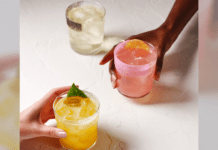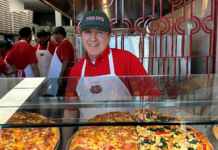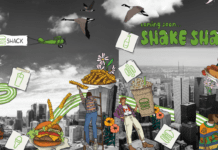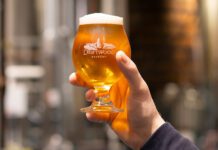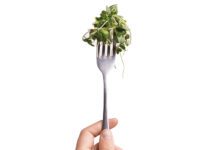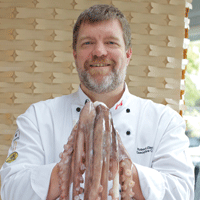“My momma always said, ‘Life is like a box of chocolates. You never know what you’re gonna get.’” — Forrest Gump
Those memorable words spoken by actor Tom Hanks in the movie Forrest Gump, apply to Robert Clark’s mandate. The Montreal-born chef, who cites Anthony Walsh and Marc Thuet among his friends, traces his love of food back to when he shared family cooking duties with his brothers. Not long after he turned professional, he grew tired of using fish that wasn’t locally sourced.
Michael Blackie, now executive chef at Ottawa’s National Arts Centre, shared many funny memories of working with Clark in the 1980s at The Windsor Arms Group in Toronto — some too colourful to print. But, despite the camaraderie, Blackie says “when service began, Robert was a very serious boy, and fish was always his passion.”
These days, at 47, Clark’s passion is stronger than ever. “Knowing where your food comes from is the single biggest thing someone can do to move towards a sustainable food system,” he says emphatically. “We’ve got to return to eating like our grandmothers did.” It’s that kind of passion that’s made C Restaurant the jewel in the crown of the Kambolis Restaurant Group headed up by entrepreneur Harry Kambolis.
Upset with shoddy fishing, poor quality seafood and a lack of accountability, Clark turned his anger into a solution. Many culinary professionals followed suit, making Clark’s work the prized piece long missing in a dog-eared puzzle that, at the time, was the Canadian seafood industry. Frustrated by a sketchy food distribution system, Clark was tired of never knowing what he was “gonna get.”
“Sea bass fillets were getting smaller and uglier. We found the fishermen were overfishing and stocks were running out. They’d caught all the big ones; the only thing left was smaller and smaller fish.” Even now, years later, Clark is clearly disturbed when recounting this ‘aha’ moment. “The majority of sea bass sold in North America was actually being poached, caught illegally in the open sea.”
And, almost as if momma Gump’s pronouncement was a harbinger of things to come, Clark says, “you didn’t know what you were getting. I didn’t even believe it was Chilean sea bass; I thought they were selling us something else. The fillets were so far from what I knew as Chilean sea bass.” The solution came in a black skin, with pearly white flesh and a sweet flavour. “We needed to find something harvested more responsibly, and we found Canadian sablefish [black cod].”
Walking possibly the world’s quietest dog known to man — his Wheaton Terrier, aptly named Seabreeze — through a Vancouver park, Clark stops to talk to F&H about his passion for food, sustainable resources, his distaste of the food cartel skulking behind the stuff we eat and his employer’s C Blue Foundation.
Clark’s days are usually random. Asked how he’s doing, he quips, “I’m not behind schedule today — so that’s all good.” Pressed a little further, he says, “And when I wake up, no day ever turns out like it’s supposed to.”
But there was nothing unplanned about his sense of innovation, creativity and desire to source the best food products available, now the cornerstone of his success. With a voracious appetite for learning and a passion for sustainable seafood, winning was always a part of his plan. He took the serious issues surrounding sustainability to the attention of the masses. Donning waders and a lifejacket, Clark is the man in whites who went fishing with suppliers to see first-hand how the quality on the plate is the result of proper catching, bleeding and icing of the day’s catch.
With the usual pleasantries quickly dispensed, Clark’s answers are short but sweet. A feeling builds as if he’s ready to unleash himself.
He’s itching to get to the stuff that inspires him, the work that’s made him a venerable encyclopedia of all things ‘eco,’ and everything else related to sustainability, water preservation, conservation and responsible fishing.
The creative, brilliant menu Clark designed, which is executed by his brigade of 35 cooks, has placed C Restaurant on the top of virtually every ‘best of ’ list. Spot prawns — another one of Clark’s sustainable staples — with pressed veal tongue, gribiche, pickled crones, radishes and salmon caviar sells for $17. Fished for Clark by Steve Johansen, the spot prawns took first place at the 2010 Gold Medal Plates competition. Clark’s “keep-it-fresh-and-simple” approach is evident in C’s albacore tuna. It comes with short-rib ragout, salsify, carrots and licorice jus ($36) — another top seller at the restaurant. Clark’s favourite food, salmon, is also offered at C Restaurant. His crispy skin organic ocean wild salmon with chorizo and herb couscous, pea purée and heirloom tomato lists for $35. Salmon is his favourite protein because, he says, “there’s just so much you can do with it. And, out here in the West, we get several varieties. I love it.”
Something else he loves, as his track record proves, is a spirited debate. His tenacious streak goes back to when he was sous chef working under Michael Bonacini at Three Small Rooms, in the Windsor Arms Hotel in Toronto. Anthony Walsh, now corporate executive chef of Oliver & Bonacini Restaurants, was an apprentice back then, and he remembers Clark fondly. He says Clark was a commanding figure in the kitchen and “very opinionated even back then before the fanfare that Rob’s got now,” adding, “he had a belief in his opinion that his way of doing it was the best way.”
Clark is switched on when it comes to boosting the environment; after all, he and his boss, Kambolis, discovered several dozens of varieties, all quality seafood, locally harvested. But his smarts also boost the Kambolis bottom line. “C’s doing well, but it had to reinvent itself when the shit hit the fan two years ago.” To make it through the bleak period, he says, “we got into catering, which is now a huge part of C’s revenue. A big part of our cash flow is the catering arm.” In fact, it has boosted sales by $1,000,000. “It really helped the restaurant survive,” he says. And, the weather on the coast can interrupt anyone’s cash flow, he says. “C is packed every night — it’s hard to get a reservation — but the down side is, we’ve had such a rainy season and with C being a sunny restaurant, every rain day probably cost us about $10,000 to $15,000.”
Clark’s reputation for passion, commitment, community involvement and impact on the industry is well deserved. Not only did Clark inspire his peers to plan menus more responsibly in an eco-friendly way, he also leads the pack when it comes to giving back to the community.
“We give back in time and money. Every week there’s something. We just did a charity event for Providence Farm,” he says, referring to an organic farm in B.C. dedicated to restoring the spirit and skills of those with physical, mental and emotional challenges. And, the James Barber Memorial Dinner, as it’s known, is one of many events Clark attends to give back to the community from which C Restaurant draws its customers. “I donated my time and the restaurant donated the food. And, this week, I’m going to New York, which costs us about $10,000 in flights and hotels for a team to go and feed 18 people for charity,” he says proudly. “We auctioned it off for another charity.”
C Restaurant has always been a major proponent of preserving our oceans and fishing responsibly. However, this year, Kambolis Restaurant Group created its own foundation with the focus on ocean sustainability, watershed preservation and sustainable farming and fishing. “It’s all about water and water conservation. It’s what C’s always been big on,” Clark says, “but now we’re funneling it in so it relieves a little of the burden off the restaurant. Now, if somebody asks me to do a charity event, I’ll go as someone from C Blue Foundation.” And, he does go, but not without championing his cause to the crowd. “I’ll raise money for the C Blue Foundation,” and recognizing the payoff, he adds, “and, of course, move our own agenda forward.”
It’s an agenda that includes educating people on pelagic longline fishing, a type of fishing that results in far too many incidental catches. “Take skipjack tuna, a lot of skipjack is caught on a pelagic longline, one of the worst ways to fish,” Clark says, clearly feeling the anger all over again. “They string out tens of thousands of hooks behind the boat, which float on the ocean. The reason it’s so bad, you’ve got thousands of hooks out there … what’s the chance the fish you’re trying to catch is gonna grab it before a turtle, an albatross or a shark?” he asks rhetorically. “The by-catch is just horrendous. It should be illegal. If I had 50 million bucks or something, I’d sink every boat that uses a longline.”
One to innovate and try new things, Clark says he’s looking at building a line of retail food, essentially grab-and-go meals for customers to pick up on the way home. And this project has a family feel to it; in a way it’s a tribute to the Kambolis matriarch, Harry’s mother. “We’ve been working with Harry’s mother on authentic Greek recipes; it’s been really interesting, explains Clark.”
Forrest Gump once said “stupid is, as stupid does.” But clearly that doesn’t apply to Robert Clark. Espousing a food philosophy that dictates sourcing only the highest-quality products, and doing as little to them as possible, Clark challenged the system and helped turn the seafood industry on its head. Through sheer determination and an indefatigable conviction, he’s proving there’s a smarter way to source food with a clear responsibility to the environment. Now, when his suppliers roll up to the back of the kitchen, with a dolly laden with fish for the day’s service, chefs across Canada know what they’re “gonna get.”
PHOTOGRAPHY BY DINA GOLDSTEIN
More in Feature Articles
Kicking it Up a Notch: How to Add a Modern Twist to Traditional Italian Food
Making it Big: Extreme Brandz Takes the Lead
A League of Their Own: MLSE Scores Big
Hot Spot: Profiling Vancouver’s White Spot Resto
House Rules: Profiling Paul Rogalski and Olivier Reynaud of Rouge
The Elephant in the Room – Ventilation and Exhaust Systems
Rise Up: Canadian Wines Shine on Restaurant Menus
Russo Rising: Profiling Chef Russo


